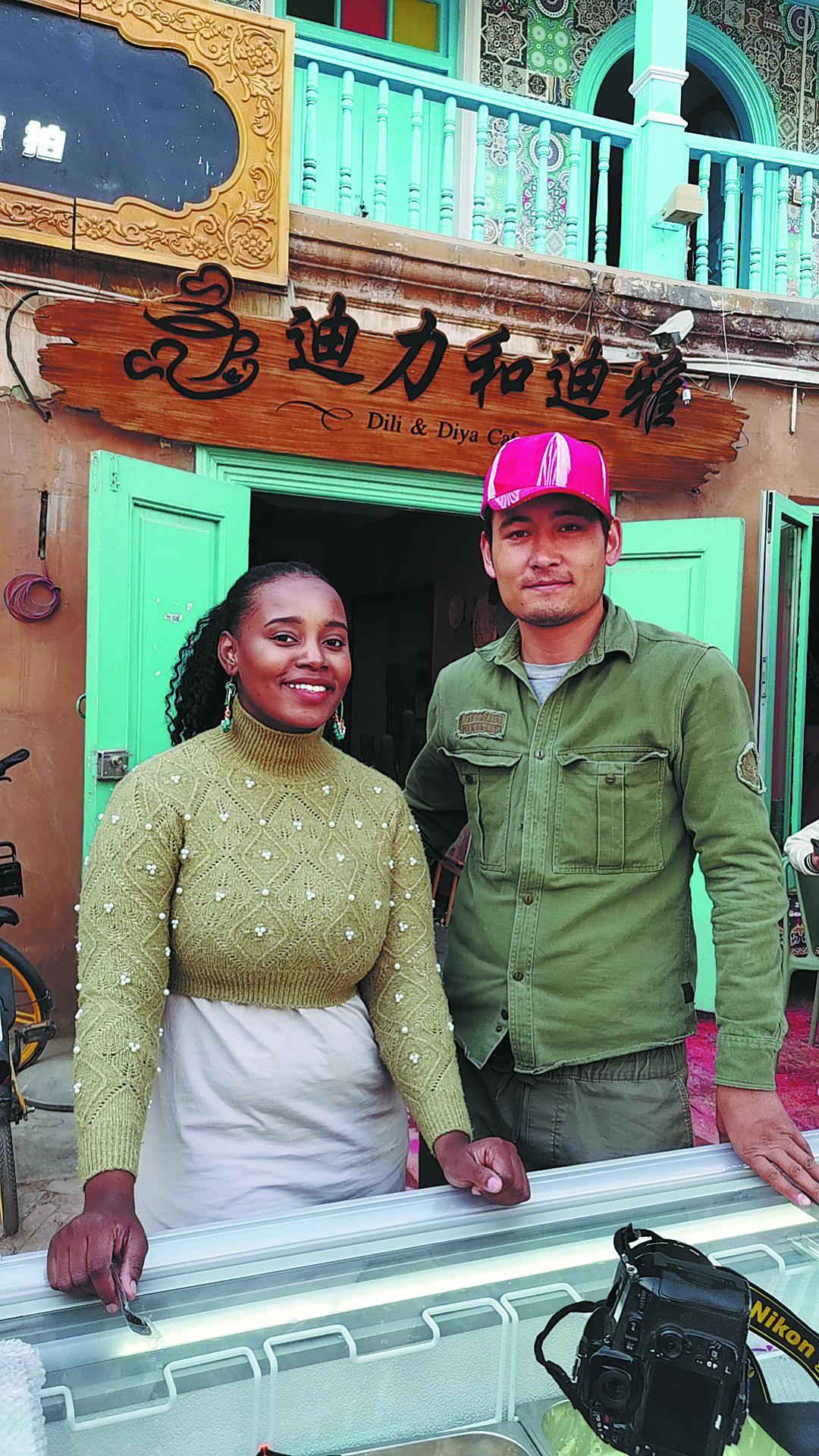Love brews in Xinjiang coffee shop
By Mao Weihua in Urumqi and Zou Shuo | China Daily | Updated: 2023-11-03 07:20

The aroma of coffee beans from Africa is only the beginning of what's really a love story.
It includes the shop's unique design and travelers — lots of travelers — in the Xinjiang Uygur autonomous region. And if you're lucky, you'll get to hear the female partner sing in a voice as rich and smooth as the swirling hot beverages they sell.
Dilxat Tursun, 30, a resident of Kashgar, and Hadiya Msham Abdulla, 30, from Tanzania, opened the shop in March near Kashgar Ancient Town, a popular tourist site. Dilxat posted promotional videos of the store and their daily lives on social media platforms. He has more than 60,000 followers on Douyin.
The shop — called the Dili& Diya Cafe — mainly sells African coffee, Xinjiang tea, juice and desserts. It is making good money as tourists come to taste the product of exotic African beans and hear a tale of love.
The couple met 10 years ago in Fuzhou, Fujian province, when Dilxat was enrolled in undergraduate studies in administrative management at Fuzhou University. Hadiya was an international student majoring in medicine at Fujian Medical University.
The two schools are adjacent, separated only by a road, so there's a shared social scene in town, including a restaurant specializing in Xinjiang cuisine. Hadiya and Dilxat were regulars, so it was inevitable — just a matter of time — that they would one day meet.
Dilxat is handsome, Hadiya says, and he speaks fluent English. He also plays a mean game of basketball and she often goes to watch.
In 2017, when Dilxat graduated from college, he returned to Kashgar and told his family about his romance. He said he wanted to go back to Fujian to be with her. His understanding father sold 20 bags of wheat and handed Dilxat the money to show the family's support.
After she graduated in 2018, Hadiya returned to Tanzania to complete a yearlong internship and become a licensed doctor. During that time, matchmakers often introduced her to promising male candidates, but she always declined. She already had a man in mind.
As a newly minted doctor in October 2019, she told her family that she wanted to return to China and marry Dilxat. According to custom, a family meeting was held to discuss the matter.
"No one in my family had married in such a distant place, so the elderly were cautious," she said.
But she pointed out the many China connections. The biggest gymnasium in her hometown is the Chairman Mao Gymnasium, and the well-known Tanzania-Zambia Railway was built with the help of China. It's called the friendship railway in her hometown, a symbol of close relations, she said.
The Belt and Road Initiative has enhanced bilateral economic cooperation, and China has built multiple infrastructure projects in Tanzania. Increasing numbers of people are choosing to study and work in China, she said.
Hadiya and Dilxat got married in 2020. After working in Fuzhou for several years, they returned to Kashgar last year. She was six months pregnant.
After their son was born, the couple took up the business, hoping to cash in on the tourism boom in Kashgar. With the help of social media, word spread about both their exotic coffee and their love story.
Zhang Lurong of Fuzhou traveled to Xinjiang in October. A friend of hers knew the couple when they were in Fuzhou and recommended the coffee shop.
"I am a big fan of coffee and drink it frequently," she said, adding that this couple's brew is special.
"It is definitely a place I will recommend to my friends. The exotic decor, the charisma of the owners and the coffee are all attractive to travelers."
That's not all, however. Hadiya is also known to sing on occasion to her customers. The business she generates is music to Dilxat's ears.
The shop can take in around 1,000 yuan ($137) per day. During the National Day holiday, several thousand yuan per day poured in. It's hard work: The shop opens at 11 am and closes at 11 pm, seven days a week. Dilxat said he and his wife have been extremely busy since the opening.
"But even though it is tiring, it's also fulfilling," he said.
With customers on the rise, the couple's channels for getting enough coffee beans from Africa to remote China have narrowed. To solve the supply problem, they have turned to friends to help out.
Dilxat said he is looking forward to the further implementation of the Belt and Road Initiative and the development of the deep-water port of Gwadar in Pakistan, which will make the shipping of goods between Africa and Xinjiang easier. Then he can spend more time sitting back and sipping.
























